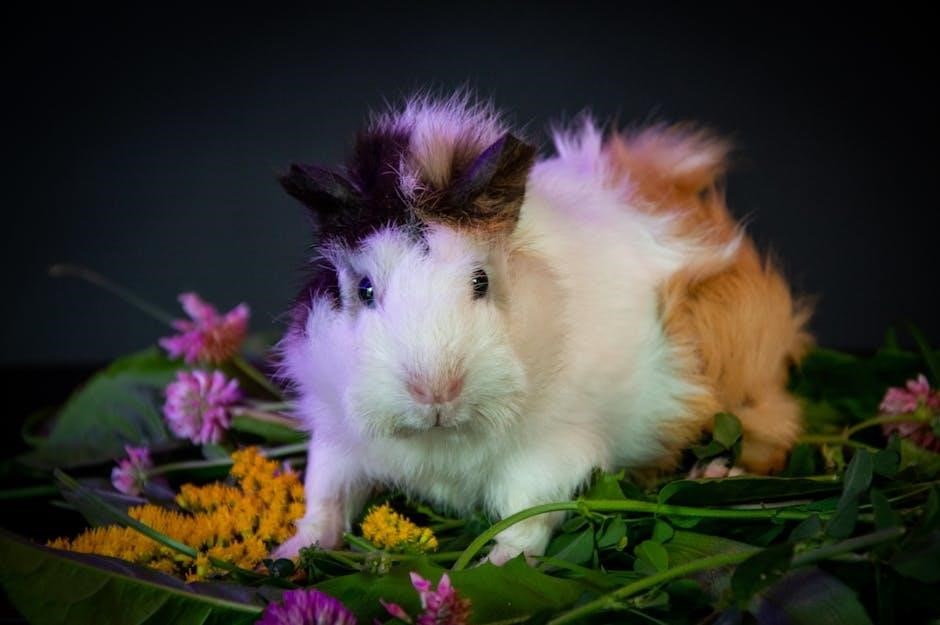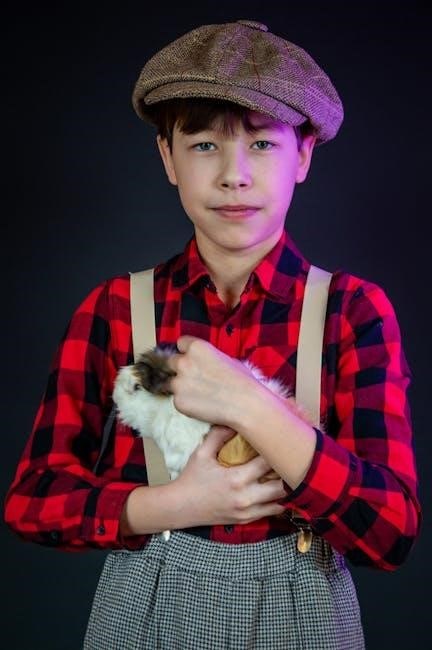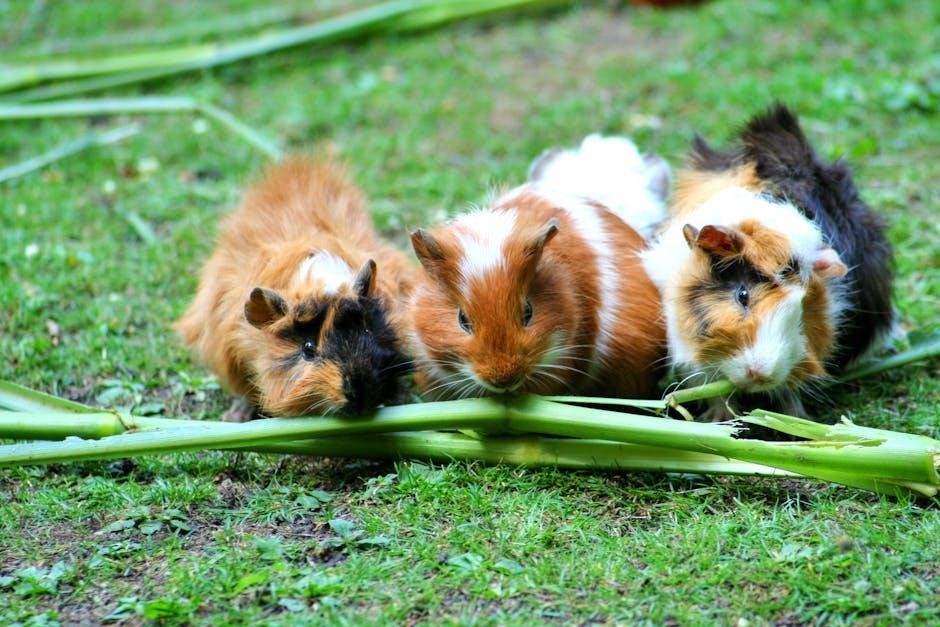
Guinea pigs are social‚ affectionate animals requiring a comprehensive guide to thrive․ They need proper housing‚ nutrition‚ and regular vet check-ups․ With the right care‚ they make wonderful pets․
Understanding the Basics of Guinea Pig Needs
Guinea pigs are social‚ intelligent animals requiring a spacious habitat‚ proper diet‚ and regular interaction․ They thrive in pairs or groups‚ needing fresh hay‚ vegetables‚ and vitamin C-rich foods․ Regular veterinary check-ups are essential‚ as they can hide illness․ A clean‚ safe environment with hiding places and toys supports their mental and physical health‚ ensuring a happy and fulfilling life for these charming creatures․

Housing Your Guinea Pigs
Providing a spacious‚ safe‚ and comfortable cage is crucial for guinea pigs․ A well-designed habitat helps prevent stress and injuries‚ ensuring their overall well-being and happiness․
Choosing the Best Cage for Your Guinea Pigs
The best cage for guinea pigs is a C&C (cubes and Coroplast) cage‚ offering ample space and customization․ For two guinea pigs‚ a minimum of 7․5 square feet is recommended‚ with 10․5 square feet being ideal․ Avoid multi-level cages to prevent injuries․ While C&C cages are popular‚ alternatives like large aquariums or custom enclosures can also work․ Ensure the cage is well-ventilated and spacious to promote comfort and reduce stress․
Minimum and Recommended Cage Sizes
For two guinea pigs‚ the minimum cage size is 7․5 square feet‚ but experts recommend at least 10․5 square feet for comfort․ Larger groups require even more space to prevent disputes and stress․ Many caretakers believe guinea pigs need more room than the suggested minimum to ensure adequate movement and happiness․ Providing ample space promotes better health and reduces behavioral issues in your pets․
Location and Setup of the Cage
Place your guinea pigs in a quiet‚ draft-free area where they can interact with the family․ Avoid direct sunlight and extreme temperatures․ Positioning the cage in a home office or bedroom is ideal‚ allowing your pets to acclimate to daily routines․ Ensure the cage is stable and secure‚ with essential accessories like water bottles‚ hides‚ and bedding arranged to promote comfort and prevent territorial behavior;

Diet and Nutrition
Guinea pigs thrive on a diet rich in high-quality hay‚ fresh vegetables‚ and limited pellets․ They require daily vitamin C from sources like leafy greens and select fruits to stay healthy․
Daily Dietary Requirements for Guinea Pigs
Guinea pigs need a diet rich in high-quality hay‚ fresh vegetables‚ and limited pellets․ Provide 1-2 cups of leafy greens daily‚ along with small portions of fruit․ Ensure access to fresh water and vitamin C-rich foods like bell peppers or oranges․ Avoid high-sugar treats and include Timothy hay for digestion․ Fresh veggies should be introduced gradually to prevent digestive upset‚ and hay should always be available to keep their teeth trimmed naturally․
Best Fruits and Vegetables to Feed
Guinea pigs thrive on a variety of fresh‚ nutrient-rich foods․ Leafy greens like kale‚ spinach‚ and lettuce are staples․ Bell peppers‚ carrots‚ and cucumbers are excellent choices․ Fresh fruits such as strawberries‚ blueberries‚ and raspberries make great treats in moderation․ Avoid high-sugar or acidic foods like citrus fruits and ensure all produce is washed thoroughly․ Introduce new foods gradually to prevent digestive upset․
Unsafe Foods and Treats to Avoid
Certain foods are harmful to guinea pigs and should be avoided․ These include dairy products‚ seeds‚ nuts‚ and processed treats with added sugars․ High-sugar fruits like grapes and bananas should be limited․ Avoid foods with artificial additives‚ as well as anything containing caffeine or alcohol․ Never feed them avocado‚ onions‚ or mushrooms‚ as these are toxic․ Always ensure treats are free from harmful ingredients․
Importance of Vitamin C in Their Diet
Guinea pigs cannot produce Vitamin C‚ making it essential to include it in their diet․ Foods rich in Vitamin C‚ such as dark leafy greens and bell peppers‚ are vital for preventing scurvy and maintaining immune health․ A lack of Vitamin C can lead to severe health issues‚ so ensuring a daily supply through fresh vegetables is crucial for their well-being․
Health Monitoring and Veterinary Care
Regular monitoring for signs of illness‚ such as lethargy or labored breathing‚ is crucial․ Guinea pigs require specialized veterinary care from an exotic pet expert to ensure optimal health․
Signs of Illness in Guinea Pigs
Guinea pigs showing lethargy‚ labored breathing‚ or loss of appetite may be ill․ Changes in droppings‚ discharge‚ or unusual vocalizations can also indicate sickness․ Their health can decline rapidly‚ so early detection and timely veterinary care are critical to prevent complications․ Regular monitoring is essential to ensure their well-being and address any issues promptly․
Finding the Right Exotic Vet
Finding a qualified exotic vet is crucial for guinea pig care․ Look for veterinarians experienced in treating small‚ exotic animals‚ as not all vets specialize in guinea pigs․ Ask for referrals from breeders‚ rescues‚ or online communities․ Ensure the vet is within a reasonable distance and can handle emergencies․ Having a trusted vet lined up is essential before bringing a guinea pig home‚ as their health can decline rapidly․
Socialization and Companionship
Guinea pigs are social animals that thrive in pairs or groups․ Keeping them alone can lead to stress or depression․ Proper introduction and ample space are crucial to prevent conflicts and ensure harmonious companionship․
Why Guinea Pigs Need Companions
Guinea pigs are inherently social animals‚ thriving in groups․ Living alone can cause stress‚ depression‚ and reduced activity․ Companionship fosters mental and emotional well-being‚ encouraging natural behaviors like vocalization and exploration․ Without companions‚ they may hide more and exhibit less curiosity‚ highlighting the importance of pairing or grouping them to mimic their natural herd environment․
How to Successfully Bond Guinea Pigs
Bonding guinea pigs requires patience and a gradual introduction․ Start by keeping them separated‚ allowing them to smell each other through a barrier․ Once they appear calm‚ supervise short‚ controlled interactions in a neutral space․ Ensure plenty of hiding spots and resources to prevent competition․ If aggression occurs‚ restart the process․ Consistent‚ positive reinforcement helps build trust and a strong bond․
Space Requirements for Guinea Pig Groups
Providing ample space is crucial for guinea pig groups to thrive․ For two guinea pigs‚ a minimum cage size of 7․5 square feet is recommended‚ with 10․5 square feet being ideal․ Larger groups require even more space to prevent territorial disputes․ Males often need more room than females‚ and multi-level cages should have levels close together to avoid injuries․ Ensure enough space for movement and enrichment․

Grooming and Handling
Regular grooming prevents hairballs and matting‚ while gentle handling helps build trust․ Use soft brushes for grooming and support their body when handling to ensure comfort and safety․
Tips for Grooming Your Guinea Pigs
Use a soft-bristle brush or grooming glove to remove loose hair and prevent matting․ Long-haired breeds need regular grooming to avoid hairballs․ Gently trim nails with a pet nail clipper‚ being cautious not to cut the quick․ Handle guinea pigs carefully‚ supporting their body and legs to avoid injury․ Regular grooming strengthens the bond and helps detect health issues early․ Reward calm behavior with treats for a positive experience․
Best Practices for Handling Guinea Pigs
Always approach guinea pigs calmly and gently․ Support their body and legs fully to prevent injury․ Handle them briefly‚ especially in the early stages‚ to avoid stress․ Daily interaction helps them grow accustomed to handling․ If they squeak‚ squirm‚ or show signs of distress‚ return them to their cage immediately․ Positive handling fosters trust and strengthens your bond with your guinea pig․

Environmental Considerations
Guinea pigs thrive in quiet‚ draft-free spaces with stable temperatures․ Place their cage in a calm area where you spend time‚ avoiding direct sunlight and extreme heat․
Temperature and Humidity Levels
Guinea pigs prefer temperatures between 65-75°F (18-24°C) and humidity levels around 50-60%․ Avoid placing cages near drafts or extreme heat sources‚ as they are sensitive to temperature fluctuations․ Ensuring a stable environment helps prevent stress and health issues‚ promoting their overall well-being and happiness․
Noise Levels and Cage Placement
Guinea pigs thrive in quiet environments‚ so place their cage in a peaceful area with minimal noise․ Home offices or bedrooms are ideal locations․ Avoid busy zones to prevent stress․ They can be kept on the floor or elevated‚ depending on preference․ Ensure the area allows for regular interaction without exposing them to excessive activity or loud sounds․
Safety Tips for Guinea Pigs
Guinea pigs require a safe environment to prevent injuries․ Ensure their cage is sturdy‚ avoid sharp objects‚ and monitor toys for hazards․ Regularly inspect their space for risks․
Preventing Injuries and Stress
Create a safe environment by removing sharp objects and ensuring sturdy cage setups․ Provide hiding places to reduce stress and avoid overcrowding․ Introduce toys and changes gradually to prevent fright․ Handle guinea pigs gently and securely to avoid drops․ Monitor their behavior for signs of anxiety‚ such as excessive vocalization or hiding‚ and address potential stressors promptly․ A calm‚ predictable routine fosters emotional well-being․
Guinea Pig-Proofing Your Home
Secure loose wires‚ toxic substances‚ and fragile items out of reach․ Block access to dangerous areas like stairs or balconies․ Use pet gates to restrict movement to safe zones․ Cover sharp edges and corners with protective padding․ Ensure all plants are non-toxic‚ as guinea pigs may nibble․ Regularly inspect for potential hazards to create a safe environment for exploration and play․

Cleaning and Maintenance
Regular cage cleaning is essential for guinea pigs’ health․ Remove soiled bedding‚ clean food dishes‚ and refresh water daily․ Disinfect surfaces with pet-safe products to prevent illness․
Daily and Weekly Cleaning Routines
Spot-clean your guinea pigs’ cage daily‚ removing soiled bedding and waste․ Refresh water and food supplies․ Weekly‚ replace all bedding‚ clean food dishes‚ and disinfect surfaces with a pet-safe solution․ Ensure hiding places and toys are clean․ Regular maintenance prevents odors and keeps your guinea pigs healthy and comfortable in their environment․
Safe Cleaning Products for Guinea Pig Cages
Use a gentle‚ non-scented detergent or a mixture of white vinegar and water to clean the cage․ Avoid strong chemicals‚ bleach‚ or scented products‚ as they can harm your guinea pigs․ Always rinse thoroughly to ensure no residue remains․ This helps maintain a safe and healthy environment for your pets․
Recognizing Signs of Illness
Guinea pigs show illness through lethargy‚ loss of appetite‚ or labored breathing․ Monitor for discharge‚ skin issues‚ or behavioral changes․ Seek immediate vet care if symptoms arise․
Common Health Issues in Guinea Pigs
Guinea pigs are prone to respiratory infections‚ vitamin C deficiency‚ and parasites․ They may also develop abscesses or foot problems from improper cage conditions․ Regular monitoring is crucial․
When to Seek Emergency Veterinary Care
Seek immediate vet care if your guinea pig shows labored breathing‚ lethargy‚ or refusal to eat․ Severe injuries‚ rapid weight loss‚ or signs of distress like squealing require urgent attention to prevent serious health complications․

Cost of Caring for Guinea Pigs
Caring for guinea pigs involves significant expenses‚ including cages‚ food‚ and vet bills․ Costs can match those of cats or small dogs‚ making budgeting essential for owners․
Initial and Ongoing Expenses
Caring for guinea pigs involves a significant initial investment in a spacious cage‚ bedding‚ and accessories․ Ongoing costs include high-quality food‚ fresh produce‚ and regular vet visits․ Guinea pigs can be as expensive as cats or small dogs‚ with yearly expenses adding up quickly․ Budgeting for these costs is crucial to ensure your pets receive proper care and attention throughout their lives․
Budgeting for Veterinary Care
Budgeting for veterinary care is essential‚ as guinea pigs require specialized attention from exotic pet vets‚ which can be costly․ Plan for regular check-ups and potential emergencies․ Set aside a monthly savings for vet bills‚ as illnesses progress quickly․ Emergency funds are crucial‚ and routine care can help prevent costly health issues‚ ensuring your guinea pigs receive the care they need without financial strain․
Dedication to proper care ensures guinea pigs lead thriving‚ happy‚ and healthy lives‚ making them wonderfully rewarding pets for committed owners․ This guide provides the foundation for a joyful journey with your guinea pigs․
Final Tips for Successful Guinea Pig Care
Ensure your guinea pigs have a spacious‚ well-ventilated cage with ample hiding places․ Provide fresh vegetables‚ hay‚ and high-quality pellets daily․ Schedule regular vet check-ups and monitor their behavior for early signs of illness․ Keep them in pairs or groups to maintain their social health․ Guinea pig-proof your home to prevent accidents․ Clean their cage regularly and avoid using harmful chemicals․ Always observe their behavior and be prepared for emergencies․ Show them love and care‚ and they’ll reward you with joy and companionship․